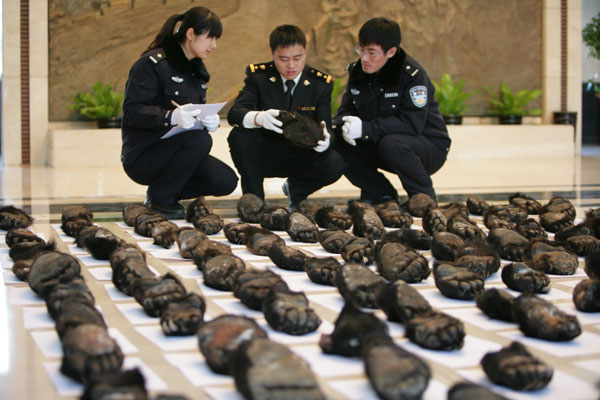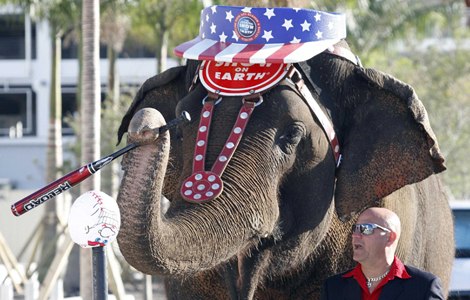Bear paw smugglers face law's claws
Updated: 2012-01-06 07:50
By Jin Zhu and Cao Yin (China Daily)
|
|||||||||||
 |
|
Police officers display bear paws seized in a smuggling case that was cracked in December in Hunchun, Northeast China's Jilin province. Provided to China Daily |
BEIJING - A recent case involving as many as 117 bear paws smuggled from a neighboring country had been cracked in Hunchun, Northeast China's Jilin province, the General Administration of Customs said on Thursday.
Eight smugglers, who carried the bear paws in two trucks, were seized when they went back from a neighboring country in the early morning of Dec 14, according to the administration.
But the administration did not disclose the name of the neighboring country. Hunchun neighbors Russia and the Democratic People's Republic of Korea.
Local authorities from Hunchun customs also found four musk glands, 11 bear gall bladders and two wild deer tails in the home of a principal suspect surnamed Du, the administration said.
Du was once held in criminal custody due to smuggling sea cucumbers in 2007 and 2009, the administration said.
Of the 117 bear paws, 103 are the paws of Asiatic black bears and 14 are from brown bears, with a market value of about 586,000 yuan ($93,000).
An official from the State Forestry Administration estimated that at least 26 black bears and four brown bears were killed.
The eight suspects have all been detained, said Tao Yong, a press officer from the State Forestry Administration.
The black bear is on the list of national second-class protected animals in China. Forest areas near Hunchun city are habitats of many rare wild animals, such as tigers, bears and leopards.
"The number of people involved in the case, I think, might be more than eight because the number of smuggled paws was large and so many bears are too difficult to be handled by only eight people," said Dai Peng, dean of the criminal investigation department of Chinese People's Public Security University.
He said there is likely a very long chain in the hunting and trafficking business.
"Usually, people who smuggle wild animals are driven by benefits, selling the precious wildlife to restaurants for expensive dishes," he said, adding such cases often happen in Northeast China where there are many species facing the danger of extinction.
Hot Topics
Kim Jong-il, Mengniu, train crash probe, Vaclav Havel, New Year, coast guard death, Internet security, Mekong River, Strait of Hormuz, economic work conference
Editor's Picks

|

|

|

|

|

|







